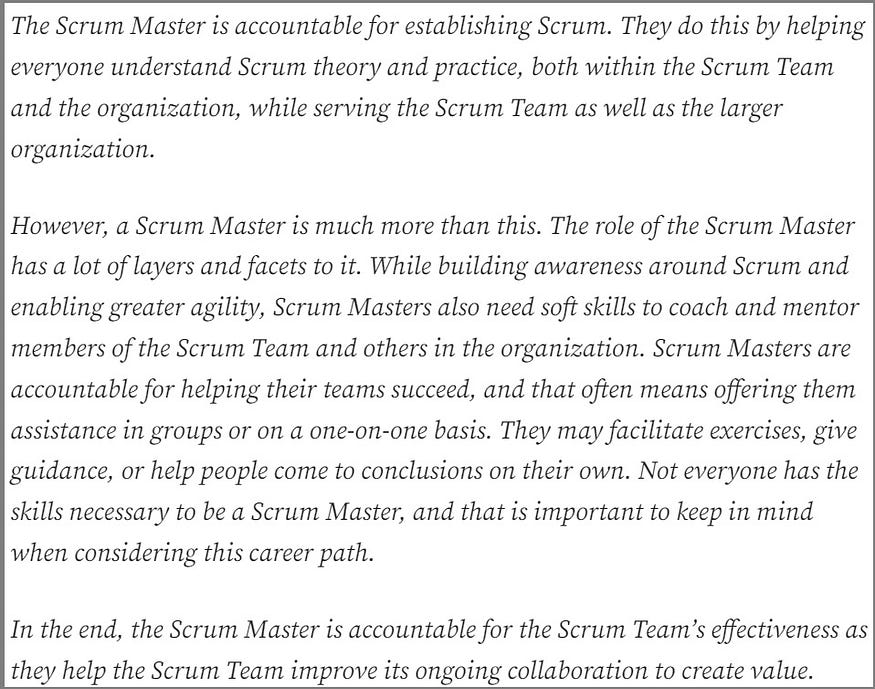Is the Party Over for Scrum Masters and Agile Coaches by Hrishikesh Karekar Apr, 2024 Medium
Is the party over for Scrum Masters and Agile Coaches? | by Hrishikesh Karekar | Apr, 2024 | Medium #
Excerpt #
Why are companies rethinking Agile Roles? A perspective based on insights from the trenches.
Why are companies rethinking Agile Roles? A perspective based on insights from the trenches. #
[


Over the past decade, agile adoption in organizations has seen an upswing. Large enterprises—banks, insurance companies, automakers, and many others—have all been at the forefront of launching agile transformations to achieve business agility—the elusive elixir. The promise of increased flexibility, faster delivery, and enhanced collaboration across teams is almost impossible to resist in today’s competitive world, where markets change rapidly, bringing risks and opportunities.
SAFe brought agile to the enterprise, and with it came a flurry of large-scale agile transformations. The rush to become agile overnight resulted in explosive demand for Scrum Masters and Agile Coaches—the two roles that were the torchbearers of this transformation.
However, a new development has emerged in recent years — companies are either reducing or pausing their hiring of agile roles, marking a shift in the agile landscape. While most have done it silently, some have gathered a lot of media attention. Capital One, for example. They decided to eliminate more than 1,100 “agile” positions a little over a year ago.
Interestingly, Capital One’s official statement reveals a lot about how they went about their transformation. That approach, though not unique to them, is one of the key sources of the developing challenge.
“The agile role in our tech organization was critical to our earlier transformation phases, but as our organization matured, the natural next step is to integrate agile delivery processes directly into our core engineering practices,” — Capital One. [ Source]
The agile transformation runs in phases, and while they don’t mention it explicitly here, Scrum Masters and Agile coaches are the educators, not the implementors. So, it is “OK’ to let go of them once the “education” or “process design” phase finishes. The actual integration of the agile processes into engineering practices is up to the engineering teams themselves.
Capital One is not alone, though. Freddie Mac let go of 75 scrum masters, and there are others who may not outright dissolve the position but have slowed down the hiring or asked the Scrum masters/Agile coaches to warm up to “other responsibilities.”
Why the sudden change of heart, though? Is this cyclical, or does the trend point to something deeper?
Buzzwords and Certifications Over Expertise and Experience #
Hiring, especially niche skills, has always been tricky. In their eagerness to join the agile bandwagon, many companies have prioritized style over substance, blinded by the agile industrial complex’s flashy marketing of fly-by-the-night certifications. There are so many of them. It’s indeed a circus.
While they may be certified, many scrum masters and agile coaches do not have the necessary backgrounds to operate in complex technical environments that modern software development is all about. Without that background, they often remain the outsider.
Additionally, many scrum masters and agile coaches have not had any organic growth or mentoring to hone their skills in change management. They were thrust into the transformation with theoretical knowledge. They struggle to drive real change or innovation, and their presence in the organization has no significant impact on business results.
They are really “good to have “but not critical.
Empty Suits and Slogans #
Given that there was no entry barrier regarding background or experience to being a Scrum master or an Agile coach, many empty suits found their way to these roles. All you needed was to shell out money (a lot sometimes) to get those certifications, and with the burgeoning demand, there was a high probability that you would find a client somewhere to take you in.
It did not help that most companies set a very low bar on expectations from Scrum Masters. They did not need the Scrum Masters for more than teaching Scrum, scheduling Scrum meetings, and updating the Jira boards. It did not matter if the Scrum Master did not understand what the team was doing—neither the technology nor the domain—or made no attempt to learn those.
All they had to do was carry the “Scrum” flag and continue ranting about the importance of adhering to the “rules of Scrum.”
They were only the “facilitators,” and so many scrum masters were content with just that.
How do you become an Agile coach?
Well, if you survive two years as a scrum master, you can start calling yourself an agile coach. Of course, you go and grab a few more certifications over the weekend. That’s how easy it is.
We have a lot of people — empty suits — who can parrot a lot of agile talk, but have no real transformation experience
Native Agile Teams #
If you have team members who graduated from university less than five years ago, they probably never worked in Waterfall; they are native Agile users.
Also, most people in the IT space by now, regardless of experience, especially those in application development, maintenance, and support, have undergone agile training. That could be just digital learning or led by an instructor, but there is a very high chance that they did get some formal training on the Agile Manifesto and/or Scrum. Though it may not be perfect, many of those are also already working on projects with some form of agile methodology.
So what does a Scrum Master or Agile coach do with those guys? Especially SM/coaches who forte is only to educate and facilitate?
If they can’t really justify their presence in the team, beyond being the policeman [or woman] for Scrum, teams see them as “overhead”.
The Theoretical Scrum Master #
The scrum guide defines Scrum Master and its accountabilities well.

All of that really makes sense, and if we have the person with the right backgrounds, expertise, and experience, they will have a very wide and visible impact on the team, program, or organization they are operating in.
However, many Scrum Masters/Agile Coaches did not come from technology backgrounds, or there was so much technology in the distant past that it has become irrelevant. They struggle to contribute to the larger success of the team/program, and pure facilitation or coaching, however well-intentioned and nicely done, is simply not enough for the team to face some of its core challenges.
The team and leadership perceive them as someone who helps them “practice Scrum [ceremonies].” In that case, they are not adding value at all and are redundant for the core business.
As Fred Deichler puts it, “You don’t get paid to practice Scrum.”
The Price Point #
Last but not least, agile roles, as their demand continued to increase during the hype cycle, experienced exponential growth in compensation — whether it was independent consultants/contractors or full-time employees.
The financial remuneration is always proportional to the perceived value in the market.
As agile transformations have struggled and the benefits of agile are unclear for many organizations, the cost/benefit ratios don’t add up, resulting in the freezing or reduction of the hiring of agile roles.
Also,
Given the strong perception developing in the C-suite that agile roles are good to have and noncritical, they are the first ones to be axed when cost control measures are introduced.
Conclusion #
The challenge with agile roles is not the role definitions or the leaders’ inability to understand agile but that the ecosystem has really created a vicious negative cycle — a cycle that continues to see “training” and “coaching” as the core part of agility. While these are important, agility requires a lot more — solid engineering, excellent product management, and much more. More importantly, it requires an appreciation that business agility is a wicked problem in the complex domain, and it needs to be treated as such. Linear, off-the-shelf, cookie-cutter solutions simply don’t work.
Agility will continue to be relevant, and even for the roles of Scrum Masters and Agile Coaches, I believe there is hope if the industry manages to create a strong talent pool of agilists who can make a visible impact on the business. That is the real problem to solve !!
Maybe the volumes will go down, and the role definitions may evolve, but the roles of Scrum Masters and Agile Coaches are here to stay—at least for the near to medium term.